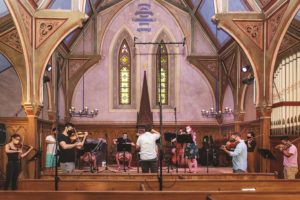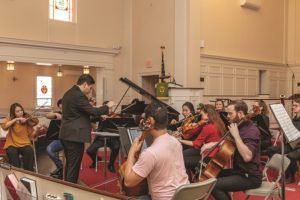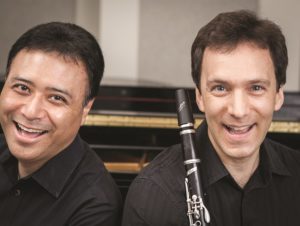The Cape Cod Chamber Orchestra’s fourth season kicks off with a performance of Dvořák’s Serenade for Strings at Pilgrim Congregational Church, 533 Route 28 in Harwich Port, on Sunday, Aug. 29, 3 p.m. The event also includes a behind-the-scenes look at the rehearsal process and a lecture. Tickets are $35 at capecodchamberorchestra.org.
Cape Cod Chamber Orchestra
Fiddle Away
Violinists Jean Huang and Michael Hustedde of the Cape Cod Chamber Orchestra are performing a virtual concert, “Violin Heroes,” on Wednesday, April 14th, from 7 to 8 p.m. Featuring music by Bach, Chevalier de Saint-Georges, Prokofiev, and others, it is a fundraiser for Steeple Street Music Academy. Watch at capecodchamberorchestra.org.
Cape Cod Chamber Orchestra Provides ‘Refuge’
“American Refuge,” a virtual concert by the Cape Cod Chamber Orchestra, will stream on Wednesday, March 10th, from 7:30 to 8:30 p.m. It was filmed at the Heritage Museums & Gardens in Sandwich. “We are pairing this impressive collection of American cars with American music,” writes music director Matthew Scinto in the announcement.
The orchestra will present the premiere of composer-in-residence Cody Forrest’s Refuge, as well as Charles Ives’s The Unanswered Question, Aaron Copland’s Quiet City, and William Grant Still’s Serenade.
Originally composed as music for Irwin Shaw’s play of the same name, Quiet City is “filled with nostalgia and an eagerness to return to a past life,” writes Scinto. “As the main character of Shaw’s play is haunted by his abandoned aspirations to become an artist, it is easy to see the parallels for us to return to a sense of normalcy in our world today.”
The concert is free to watch, but donations are appreciated, at capecodchamberorchestra.org.
A Winter’s Sale
It’s a busy week for the Cape Cod Chamber Orchestra. They kick off their virtual silent auction on Monday, December 7th, at noon, with items available for bidding through December 11th. Then, they present their virtual concert, “Songs of Midwinter,” with music by Sibelius, Elgar, Handel, and Vaughan Williams, on Wednesday, December 9th, at 7 p.m. Tickets are free, though donations appreciated, at capecodchamberorchestra.org.
CONCERT REVIEW
Now Streaming: Cape Cod Chamber Orchestra
You can hear a pin drop during its performance of Barber’s Adagio for Strings
Samuel Barber’s Adagio for Strings is a warhorse — a piece of classical music that is played so repeatedly, it ought to get old. But it doesn’t.
Partly because of its minor key and heartbreaking harmonies, Barber’s Adagio has become associated with mourning. It was played after John F. Kennedy’s assassination and after 9/11. It was the tragic theme to the Vietnam War movie Platoon. Quite a few orchestras are playing it during the pandemic. Back in May, the Berlin Philharmonic performed it in an empty concert hall, streamed online.
The piece was originally composed as the slow movement of a string quartet, but Barber arranged it for string orchestra. Arturo Toscanini conducted its 1938 premiere with the NBC Symphony Orchestra, broadcast on the radio. This was at the tail end of the Great Depression, just before World War II.
Barber’s Adagio is a highlight of the Cape Cod Chamber Orchestra’s virtual concert, “Spatial Sonorities,” streaming this Friday. The other pieces on the program are Mozart’s Divertimento in F, William Grant Still’s Mother & Child, and Peter Warlock’s Capriol Suite.
Because the concert was pre-recorded, it is possible to review it before it streams, a bit like time traveling. It was filmed in the historic Yarmouth New Church from a few different camera angles, and the editing uses some slow zooms. In this way, your “seats” are chosen for you, as well as who you choose to look at. Unfortunately, that affects your perception of the performance.
Because of Covid guidelines, there are a limited number of musicians playing. The effect sounds more like chamber music, which makes sense, considering the Adagio’s origins. Though this setup is usually a challenge for intonation, this orchestra has no problem.

The piece begins with a piercing B-flat in the first violins. The remainder of the orchestra joins in, creating a suspension. The melody in the first violins rises and circles back on itself, like a person pacing. Conductor Matthew Scinto avoids the temptation to take a tempo that is too slow or plodding.
Each time the orchestra comes together on a warm, expansive chord, it is gorgeous. When principal viola Celia Daggy gets the melody, she really shines, especially on her carefully placed portato notes.
The melody is passed to the cellists, Timothy Paek and Joseph Gotoff, and it rises into their higher register. They play a beautiful slide that sounds like a wail. If only the camera settled on them at this moment.
At the climax, all the musicians, except the poor bass player, who is left out, have risen to the highest registers of their instruments. The effect is a piercing, silvery chord. Scinto really milks it, perhaps too much. It is a tad too long, with too much vibrato. But it works in this context, because the silence that follows sounds even louder because of it.
You can really hear the room, the cavernous sonority of the church. In a virtual setting, that is some feat. And with the musicians’ bows still in the air, there is no risk of the audience mistaking the piece to be over and ruining the silence with clapping — something that happens all too often.
The rest of the piece, with its cautious starts and stops, functions as a cool down from this climax. It ends on a quiet and solemn chord, once restated.
Before you listen to this beautiful performance, a few suggestions. Use headphones, or, better yet, a good speaker. Choose a comfortable volume, and stick with it. Even though the Adagio has some dynamic extremes, resist the urge to adjust. And listen straight through; try not to pause —that email or text message can wait. Maybe even turn out the lights and let it wash over you.
Divine Night of Strings
The event: “Spatial Sonorities,” a virtual concert by the Cape Cod Chamber Orchestra
The time: Friday, Oct. 2, at 7 p.m.
The place: Streaming at capecodchamberorchestra.org; recorded at Yarmouth New Church
The cost: Free, but $20 virtual tickets are suggested
Harp Strings Pulled
Matt Scinto, conductor of the Cape Cod Chamber Orchestra, and harpist Charles Overton are virtually presenting a concert, filmed at Maplewood at Brewster Senior Living, on Wednesday, September 16th, 2 p.m., in honor of National Assisted Living Week. RSVP by contacting Angela Angelini at 774-323-3983 or [email protected].
ARTS DURING COVID
Chamber Music Ensembles Attune to the Pandemic
Breathing together, with and without a mask
Could this be a new age for chamber music? With small ensembles and limited audiences, chamber music certainly seems more Covid-friendly than, say, Mahler’s “Symphony of a Thousand.” But what are the logistics of performing chamber music right now, and how are Cape ensembles adapting?
Battle of the Instruments
Greek mythology tells of a musical contest between the god Apollo, who played the lyre, and the satyr Marsyas, who played the pipes. Apollo won because of a few party tricks: unlike his hairy opponent, he could play upside down, even while singing — he didn’t need his mouth to play.
This story captured the Renaissance imagination, especially the idea of a division between elegant string instruments and lowly wind instruments. And it has some added relevance today. When it comes to Covid, not all instruments are equal. Studies show that singing and playing wind instruments may expel more of the virus. These musicians also cannot perform while wearing a mask.
That is why Gov. Baker’s current guidelines, which allow outdoor performances only, require singers and wind players to maintain more distance during a concert than string players and other instrumentalists. Singers and wind players must stay 10 feet apart and 25 feet from the audience, while everyone else must clear only the standard six-foot separation.
Breathing Together
Matthew Scinto, conductor of the Cape Cod Chamber Orchestra, says that higher expenses preclude live outdoor performances for his ensemble. Between finding an outdoor venue with enough cover — wooden string instruments do not like the rain — and hiring a sound engineer for amplification, it’s simply not feasible.
Right now, “If you do a chamber music concert, it’s going to be virtual,” Scinto says. And that is indeed what his group is planning for late September. A reduced ensemble of about 10 string players will rehearse on Cape Cod and shoot a concert at Yarmouth’s New Church.

Scinto emphasizes that “an orchestra is not a string quartet.” You can’t round up four orchestral players and expect them to mesh perfectly, since chamber music requires hours of rehearsal and getting to know each other closely. This is “subtle stuff for most listeners.”
One challenge Scinto foresees is how the musicians will play with masks. “Such an important part of string playing is breathing together,” he says.
Musical Communication
Craig Combs, artistic director of Chamber Music for the Outer Cape, which is based at the Pilgrim Monument and Provincetown Museum, is similarly planning a live-stream concert for Aug. 20.
It will consist of works by Fauré, Copland, and William Grant Still played by violinist Jeffrey Thurston; theater pieces performed by singer Halcyon Hurst; and Beethoven’s “Moonlight” Sonata, performed by Combs on piano.
Combs says he hesitated to include a singer, as they “expel the virus more efficiently.” But all the instrumentalists will wear masks, and the singer will be positioned to face the double doors leading outside. Even so, “It’s quite difficult right now to rehearse,” he says.
While a live-stream concert scratches a certain itch, it is not the same as an in-person performance. “In chamber music there is communication,” Combs says. “And when you have an audience, it is so much more interesting. You get feedback. You hear someone take a breath during a particularly beautiful passage. Normally, we are not very far from the audience, maybe five feet. They are right there with us — they are hearing us breathe.”
Another Provincetown series offering chamber music is Great Music on Sundays @5, which traditionally had its spring-to-fall season at the Unitarian Universalist Meeting House. On Aug. 16 and 30, the series will present live-stream concerts of baroque music performed by Greg Gettel on trumpet, soprano Elise Groves, Frederick Jodry on clavier, and Eric Maul on flute.
A Question of Intimacy
The Cape Cod Chamber Music Festival, which brings world-class musicians to Wellfleet and around the Cape every August, announced they would be going virtual back in May.

Artistic directors Jon Manasse and Jon Nakamatsu will narrate three hour-long programs of archived performances from the festival. These will be released on the first three Tuesdays of August. There will also be a video event with memories, anecdotes, and musical clips by artists who have graced their stage.
Originally, there was going to be a live recording session with musicians in New York City, but travel restrictions have made it unfeasible for the time being. Nakamatsu, who is from California, would have to quarantine for two weeks.
“The basic tenet of chamber music is that it is intimate,” says Manasse. Though this can be construed as a positive, with fewer people, there is also an element of closeness that is currently unachievable.
“If you’re reviewing concerts now, and they only allow 10 people in the audience, you can write ‘to a sold-out crowd,’ or ‘a packed hall,’ ” Manasse jokes.
Manasse, who’s a clarinetist, says he played in a socially distant concert in Colorado in June, separated from his colleagues by plexiglass. “The string players were wearing masks, and we realized that there is so much subtle nuance to facial gestures,” he says. “Just the littlest thing can communicate direction, color, feeling, ensemble.”
Nakamatsu agrees that communication in chamber music is subtle and mysterious, and he wonders how it will be affected by the pandemic. “When your artistic sense is so compatible and so attuned to each other, that goes beyond the mechanics of it,” he says. “It’s an aesthetic, almost spiritual thing.”
